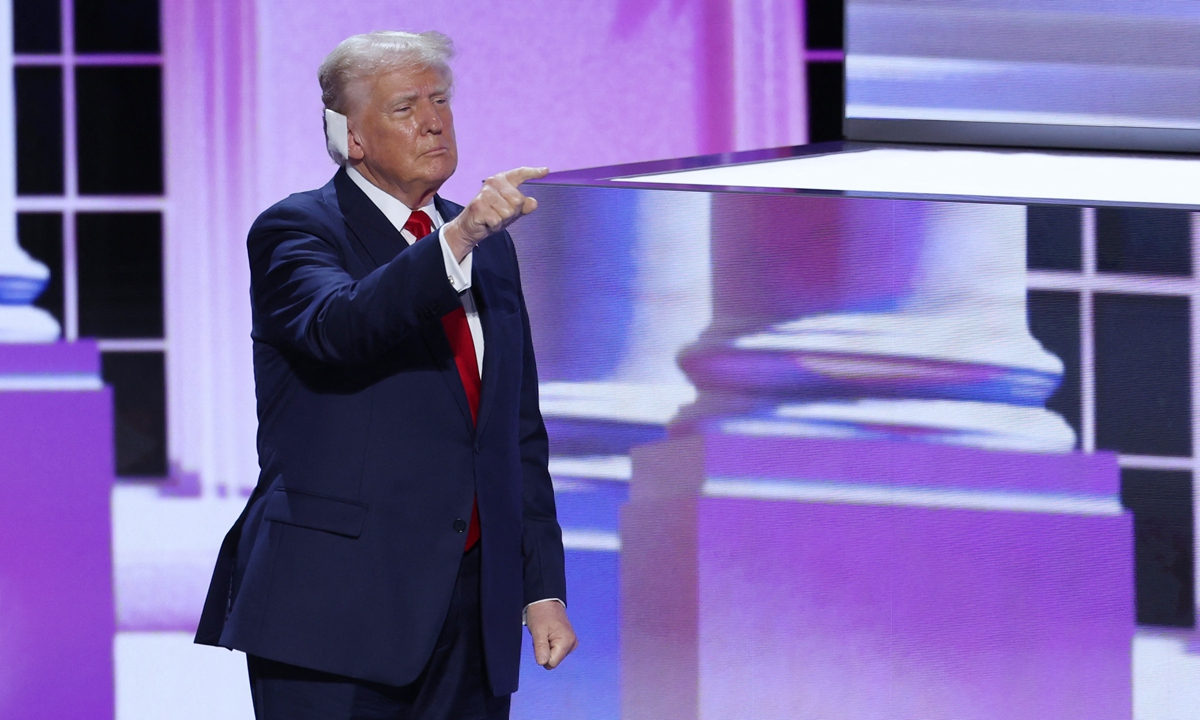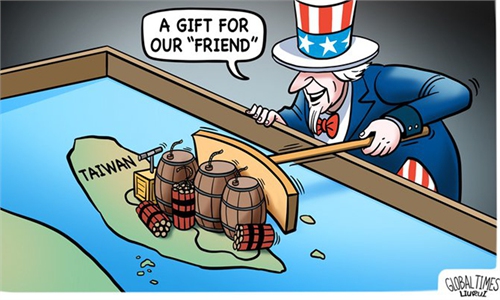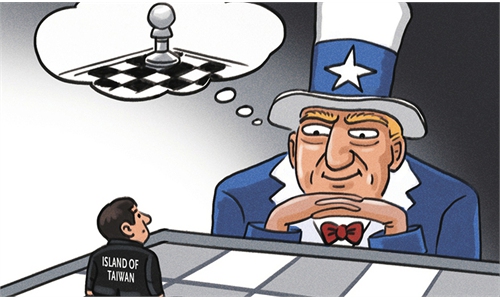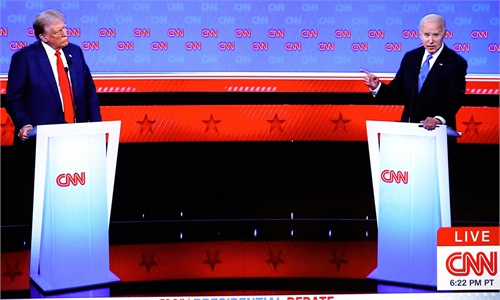Trump accepts GOP nomination, election still in whirl of uncertainties
'Voters shrouded in disappointment as none of nominees able to fix crisis'

Former President Donald Trump addresses the Republican National Convention on July 18 night local time. Photo: VCG
Former President Donald Trump, in his address at the Republican National Convention on Thursday night, officially accepted his party's nomination for a third consecutive presidential election, boasting about how good the US economy will be and highlighting the lack of foreign entanglements during his presidency.
Despite Trump's nomination, the US election is still in whirl of uncertainties. American voters remain disappointed as none of the nominees, whether Trump, Biden, or a new Democratic figure, seem capable of addressing major election issues such as inflation, immigration, and external crises, observers said.
During the convention, Trump pledged to tackle both domestic and global crises and vowed to restore the US' standing on the world platform. He expressed strong confidence in his ability to prevent wars through a simple phone call.
"Under my plan, incomes will skyrocket, inflation will vanish completely, jobs will come roaring back, and the middle class will prosper like never, ever before and we're going to do it very rapidly," Trump said.
Slamming Biden's failure in handling international conflicts, Trump said, "war is now raging in Europe, in the Middle East, a growing specter of conflict hangs over Taiwan, Korea, the Philippines, and all of Asia." He boasted of being able to resolve these conflicts if re-elected.
In response to Trump's remarks, Chinese Foreign Ministry spokesperson Lin Jian stated that the Taiwan question is a purely internal affair of China and does not permit any external interference. China has consistently opposed US making China an issue in its election.
Facing inflationary pressure domestically and given US public's dissatisfaction with the current government's handling of international affairs, Trump clearly knows how to please his audience by telling them he will fix everything. However, when there is a lack of complementary measures, verbal promises merely remain as words, Diao Daming, a professor at the Renmin University of China in Beijing, told the Global Times on Friday.
"Sadly, from an economic common-sense analysis, Trump's ambiguous vision of ending the inflation crisis immediately, bringing down interest rates and lowering the cost of energy are incompatible with each other," said Lü Xiang, research fellow at the Chinese Academy of Social Sciences.
CBS news quoted Wall Street economists who wrote that the key policies undergirding so-called Trumponomics - a combination of tariffs, tax cuts and a crackdown on immigration - are likely to cause a flare-up in inflation.
Time will be needed to calculate the impact of Trump's speech on his advantage in the election. The CBS poll released on Thursday indicates that Trump is leading nationally among probable voters by 52 to 47 percent. This is a slight increase from the previous survey on July 3, where he held a two-point lead at 50 to 48 percent.
The slight advantage in the poll does not suggest that voters believe Trump can solve the problems troubling the US, but rather that the public believes the current solutions are unsatisfactory, so they want to make adjustments, observers said.
"It's not because someone is better, but because there is no other choice. American voters are shrouded in disappointment over the entire election," Diao said.
The current domestic and international issues facing the US are major problems characterized by sharp contradictions and opposition, leading to a situation where the president is fundamentally unable to respond to the demands of the majority through compromise and policy adjustments, but can only act as a "president of the minority" to satisfy certain specific interests, Diao explained.
Voter sentiment is the same for the 81-year-old Joe Biden, who has been facing continuous calls to drop out of the presidential race. Additionally, sensationalist headlines in US media about Biden allegedly dropping out of the election have left the public confused.
Democrats are divided over whether to keep Biden in the White House race. Critics have pointed to Biden's recent verbal slip-ups, even though Biden has shown certain response skills by calling on Americans to "lower the temperature" of political rhetoric in a recent address from the Oval Office.
Some Democrats believe that Biden's Vice President Kamala Harris would be a good alternative to replace Biden as the Democratic nominee out of consideration of identity politics. Concerns are also mounting within the party that Biden's candidacy could negatively impact their campaign efforts in both houses, Lü said.
Diao believes that the Democrats' reaction to Biden's candidacy highlights the party's internal divisions.
"About 100 days remain until the election. Based on past experience, by now the primary stage should essentially be over, and the general election phase should be starting. Looking at the current situation, the US election is still in a whirl of uncertainties," Diao noted.
It's still uncertain whether Biden will drop out of race. Even if he does step aside and makes way for a new Democratic nominee, it will not alleviate the drag of major election issues such as inflation, immigration, and external crises. For example, issues like the Russia-Ukraine conflict and Israel-Palestine war have caused dissatisfaction among young Americans, experts noted.





